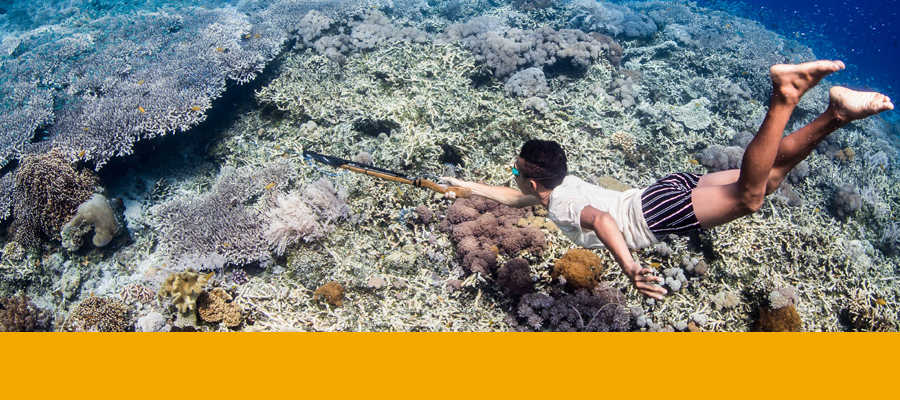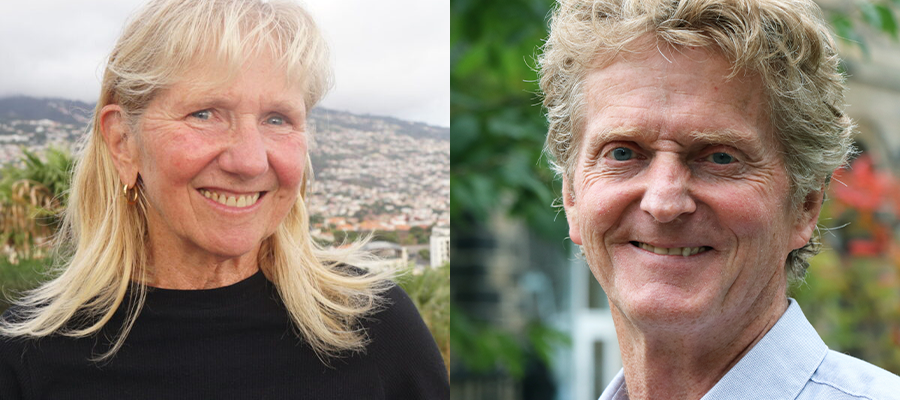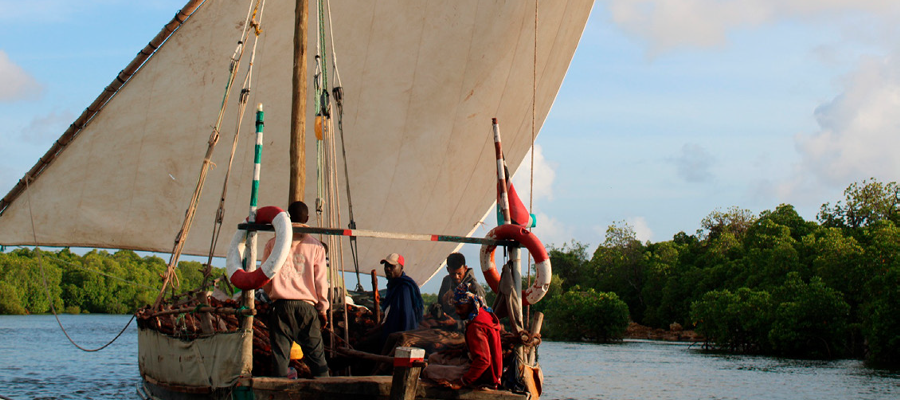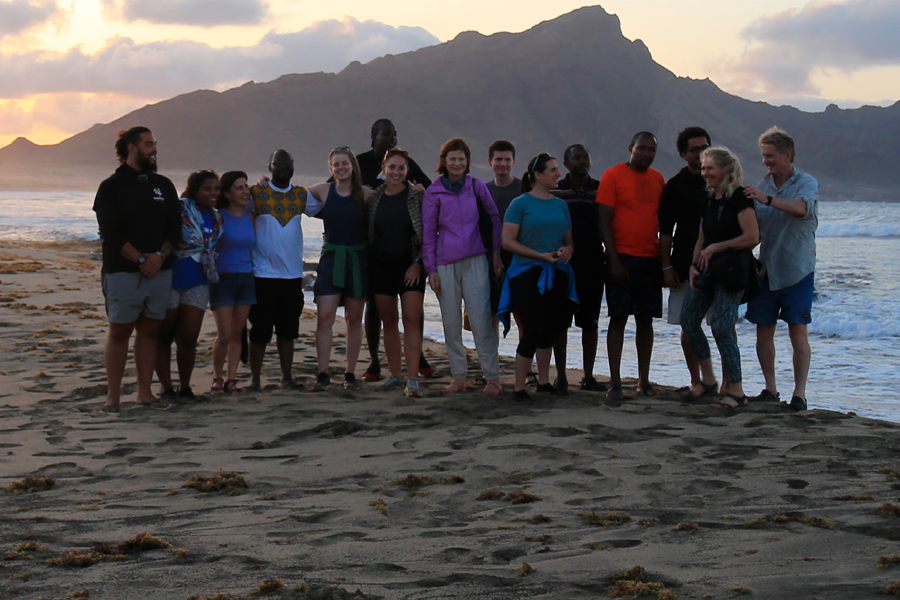Leaders rising with the tide

Across 30 countries, the University of Edinburgh’s Ocean Leaders are turning science, policy and community insight into lasting impact. Their stories reveal how strong leadership, not just innovation, is driving change for the ocean and the people who depend on it.
The Edinburgh Ocean Leaders programme was born from a clear observation of need, combined with a simple but powerful vision of how to accelerate positive change through remarkable people. As co-founders Dr Meriwether Wilson and Professor Sandy Tudhope explain: “Through decades of immersion in ocean environments for work and pleasure, we have been witness to remarkable rates of change, much of it for the worse. Ecosystems collapsing. Communities losing their livelihoods. But we’ve also seen extraordinary examples of creative solutions turning existential challenges into pathways to a better future.”

Dr Meriwether Wilson and Professor Sandy Tudhope, co-founders and co-directors of Edinburgh Ocean Leaders
Those successes, Meriwether notes, were never accidental. “Behind them was almost always an exceptional individual – someone with skill, creativity, and emotional intelligence, able to build coalitions and co-ownership of enduring, context-appropriate solutions across sectors.” Yet despite a global push to engage young people, one group was overlooked: those courageous early mid-career ocean professionals already on the front lines, driving positive change, but at an inflection point where they need support to go to the next level. “There was nowhere explicitly supporting them,” she says. “So we set out to create a programme built around what they needed to amplify their impact – leadership coaching, creativity, reach, and a trusted and globally-networked community.”
Since the launch, that vision has held steady. “We’re uplifted by what we’ve seen,” Sandy reflects. “Leaders from across the world and across sectors building skills, confidence, expanding influence, and accelerating impact.” Meriwether agrees: “The programme has become a transformational enabler – strengthening leadership and providing a close-knit, trusted community. Crucially, these leaders are the change-makers of now, and the decade ahead, when it is most needed.”
So Edinburgh Ocean Leaders (EOL) began — not as a traditional University course or degree, but as a creative initiative to build skills, awareness and a global leadership network.
Since 2020, 48 Ocean Leaders across 30 countries have been selected through a global nomination process. They’ve contributed to protecting 690,000 km² of ocean, influenced 70+ policies, supported hundreds of thousands of coastal livelihoods and steered tens of millions of dollars toward ocean action. Figures help demonstrate scale, but they don’t capture what truly drives change: people. What happens when committed leaders gain confidence, networks, and the tools to lead more effectively? The case studies that follow show the answer in real terms.
Philippines — A place to breathe and to grow
For Jhorace Tupas, the ocean is family, food and memory. As programme lead in the Philippines’ Department of Environment and Natural Resources, she helped build the 12-year national strategy managing marine protected areas (MPAs) across the entire archipelago, aligning with the global 30×30 ambition (30% of area protected by 2030).
“A key focus was aligning national efforts with global ambition,” she says. “Ensuring MPAs not only expanded but remained healthy and resilient. This meant integrating ecosystem-based adaptation strategies, enhancing biodiversity safeguards, and advancing sustainable ocean finance for long-term resilience.
It was demanding yet satisfying work.
“EOL provided a safe space where I could be myself,” she says. “A place I could openly discuss and reflect on leadership challenges in the workplace. The program offered valuable training, one-on-one coaching, and mentorship sessions, making the experience deeply personal, enriching, and uplifting. It became an annual retreat for me—a refreshing pause from my busy schedule.”
And the support of her peers in the network proved invaluable:
“One of the greatest gifts of the program was the opportunity to engage with ocean leaders from diverse fields and backgrounds worldwide. I am deeply grateful for the friendships I’ve built, which have grown into a supportive network that feels like family—people I can turn to when navigating similar challenges in the workplace, even those uncharted ones.”
Kenya — Let them all speak

Fishermen on a wildlife reserve in Kenya
Willys Osore oversees a sweep of Kenya’s northern coast: biosphere reserves, national parks, and seven villages where 10,000 people tie their future to the sea. Fishing subsidies, micro-finance programmes for women, coral restoration, school bursaries – his role spans ecology and community care.
He remembers a particularly charged community meeting where voices clashed and quieter participants fell silent.
“Before EOL, I might have avoided stepping in,” he says. “But I had learned to listen differently — to see conflict not as threat, but opportunity.”
So he intervened – not to quiet the loudest, but to invite the quietest.
“Every person had the chance to speak. That changed the tone entirely. When people feel heard, solutions emerge.”
The shift is subtle but powerful.
“Through EOL, I have gained skills that have supported my direct engagement with communities,” says Willys. Since then, Willys and his team have gone on to be awarded IUCN’s ‘Word Commission on Protected Areas’ prestigious Ranger of the Year, 2025.
United Kingdom — Science isn’t enough. We need connection
Dr Imogen Napper has traced plastic from washing machines to oceans, found microplastics on Everest’s snow, and helped spark the global microbead ban. Her research altered industry standards — but impact is never only academic.
“I investigate the sources and pathways of plastic pollution in the marine environment,” she says. “I focus on key contributors such as microbeads from personal care products, synthetic fibres shed from clothing, and plastic waste in our communities. My research provides critical evidence to consumers, governments, and industries—empowering informed decisions and inspiring real, measurable change.
“By tracing the journey of plastic from local environments to global systems, I highlight its connections to broader environmental challenges, even drawing parallels between ocean pollution and space debris. While individual actions matter, my work underscores the urgent need for bold, global commitments from industries and governments to address the scale of the crisis.”
Now working across Eastern and Southern Africa, Imogen brings science to policy, community innovation, and business:
“Joining Ocean Leaders has given me confidence and helped me navigate imposter syndrome. It has connected me with the marine conservation community beyond my research area, guided me toward my next career step, and fostered lasting friendships”.
South Africa — Momentum is made of people
When Alexis Grosskopf talks about the ocean, he talks about entrepreneurs — fishers reinventing value chains, startups restoring reefs, coastal innovators building new economies. As Founder of OceanHub Africa, he has guided 54 ocean-impact startups, unlocking $10.5 million in investment and creating hundreds of jobs.
“The focus of my work has been to help advance investment into Africa’s blue economy,” he says. “Through OceanHub Africa, six acceleration programs have supported 54 ocean-impact startups, collectively creating over 420 direct jobs and raising more than $10.5 million in investment. As a founding co-chair of the 1000 Ocean Startups coalition, I’ve worked with others to connect incubators, accelerators, and investors around a shared goal of driving ocean innovation.”
EOL accelerated his vision.
“Since joining the Edinburgh Ocean Leaders community, collaboration with fellow members has been both inspiring and instrumental. From joint action on plastic pollution and coastal community training to policy advocacy and summit facilitation, the relationships built through EOL continue to shape and strengthen my work. The peer exchanges and mentorship opportunities offered have been particularly meaningful and enriching.”
Leadership as a tide

A group of Edinburgh Ocean Leaders during a field expedition
Becoming an Ocean Leader is just the beginning of the journey for each new cohort.
Beyond the Foundation year, the Ocean Leader Community provides a largely-online platform for collaboration, enabling leaders from diverse backgrounds to connect, share expertise and develop joint initiatives.
It costs roughly £35,000 to support one Ocean Leader through the programme, enabled through the generosity of The Prince Albert II of Monaco Foundation, the Castansa Trust, the Blue Marine Foundation and other individual supporters. A core pillar is that these Leaders stay in their home regions, strengthen teams, change systems, and uplift communities.
There are events and conferences, an annual meeting in Edinburgh and public events. A field mission is another cornerstone of the foundation year, providing an immersive, ocean-centred week focused on team building, knowledge exchange, and transformative learning experiences. As Tommy Melo from Cabo Verde says:
“Being part of a group with various skills and having the chance to evaluate real-world situations first-hand is invaluable. It benefits us both strategically—by gaining professional insights—and personally, as we often navigate between high-level conferences and academic discussions. These experiences remind us of the core reasons we’re working so hard for the ocean’s preservation.”
For Sandy and Meriwether, this is the point. “We are not training leaders of the future,” Sandy says. “They are leaders now.” Meriwether adds, “The next decade is decisive. Supporting these people – at this exact moment in their career – matters.”
Sandy and Meriwether’s original vision for the Edinburgh Ocean Leaders programme was to grow one of the most influential and impactful networks of ocean change-makers, delivering the solutions we urgently need over the coming decades. By the evidence of these global case studies, they are well on their way to achieving that.
To find out more, including how to support this vision, see the website or contact Meriwether and Sandy directly at ocean.leaders@ed.ac.uk or Veronica Royce (Development Manager) at veronica.royce@ed.ac.uk

